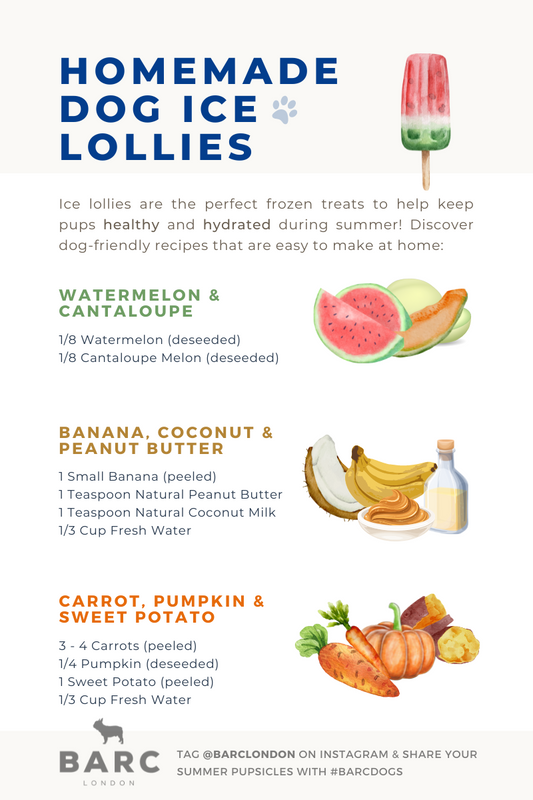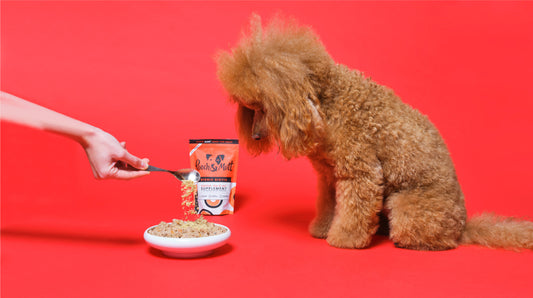Keeping your puppy hydrated is essential to supporting healthy growth and giving them the best chance of a long and happy life.
Just like us, our dogs need water to help their body cells function normally. Water helps to circulate blood around the body, aiding digestion and keeping organs healthy.
Water also helps with regulating temperature - something that is super important for pups now the temperatures have risen.
As we start to enjoy the warmest days of summer, it's important to consider whether your pup is drinking enough to stay hydrated.
If you notice your puppy not drinking water, don't panic! There are lots of things you can try to increase their water intake.
- When do puppies start drinking water?
- How much water should a puppy drink?
- Do puppies need water at night?
- My puppy won't drink water, what can I do?
- How to get a puppy to drink water:
- My puppy is drinking a lot of water, should I be concerned?
- Puppy Water Schedule Chart:

When do puppies start drinking water?
Before you even bring your puppy home, they will have already been introduced to to drinking water.
Puppies start drinking water at around 3 - 4 weeks of age, at the same time they switch from milk to solid food and once their teeth have started to grow.
How much water should a puppy drink?
As a general rule of thumb, a puppy needs approximately 30ml (1oz) of water per 0.5kg (1lb) of body weight. However, the exact amount of water needed to keep them happy and healthy will vary, as each and every puppy is wonderfully unique.
💡 Top Tip: Use a water intake calculator to work out just how much water your dog needs for their weight and activity level.
While size plays an important part in their water needs, it’s not the only influencing factor.
While a 5kg puppy only needs around 300ml water a day, you may find they drink more if they’ve been running around a lot, or if it’s a little warmer outside.
Even when the weather may be too warm to walk your puppy, they’ll still have energy to burn off during play, so making sure they stay hydrated is always super important no matter what.
As a first time dog owner, you might be wondering how long a puppy can go without water, in which case the below information can help.
Do puppies need water at night?
Unless your puppy is unwell or suffering from a medical condition, you should avoid leaving water out for them at night.
Most puppies over the age of 12 weeks can go without water for 8 hours, but it's inevitable that you may wake up to a mess every now and then.
Young dogs under 12 weeks are not able to hold their bladder for too long, and up until around 9 months old they're likely to need the toilet with 10 - 30 minutes of having a drink.
By stopping water intake before bedtime, you limit the number of night time wake up calls and decrease the chances of any accidents occurring.
This is primarily the case during toilet training, before a puppy becomes a dog and is still learning the ropes.
Over time, your puppy will start to settle and sleep through the night, and when this happens, you won't need to remove their water anymore.
My puppy won’t drink water, what can I do?
It’s completely natural to be concerned when you don't think your pup is getting enough water, but there are several things you can do to encourage them to drink more:
- Keep their bowl clean and water fresh - By cleaning their bowl regularly, you remove any excess drool or grime that could be sitting around. Refilling their bowl with fresh water can also encourage healthy puppy hydration.
- Consider their water bowl position - Whether that’s next to their food bowl, close to their bed, or in their favourite chill out space in your house. Find a space that works for them and don’t be afraid to change it up if you think that will help.
- Reward them when they drink, using treats or positive praise. They’ll soon learn that drinking is a good behaviour and it makes you happy when they do it.
- Grab some ice cubes - Whether you drop them in their water bowl, or give them a cube to suck on and chew, this can be a great way to get more water in them without forcing them to drink from their bowl.
- Tempt them with taste - If you’re really struggling to increase their water intake, a top tip for how to trick a dog into drinking water is to try adding some chicken broth or bone broth to their bowl to make it more appealing. You could also add a little water or wet food to their dry kibble, or switch out some of their treats with high water content foods like cucumber or watermelon, or even dog ice lollies if you notice your dog wont drink water but will eat.
How to get a puppy to drink water:
If your puppy is less motivated to drink water, or you’re in the process of transitioning them onto solid food, the following steps could help to encourage them to slurp up the good stuff.
- Start by adding warm water to their dry food. This will create a soup like consistency and give them a chance to slurp up the water as they eat, familiarising them with the idea of drinking liquid from a bowl.
- Use a shallow dish as a puppy water bowl. Instead of opting for a deep water bowl, opt for something with a low edge so it’s easier for your puppy to drink.
- Praise them when they drink. Leave their bowl down during the day so they can easily access it and drink when they’re thirsty. Each time they go for a sip, reward them with praise so they know this is desirable behaviour.
- Entice them with ice or taste. If they’re still not getting the hang of it, make drinking a little more enticing, either by using ice cubes for them to chase around, or adding a little bone broth to spice things up. Once your puppy is drinking more regularly you can wean them back to plain water, knowing you’ll have a happy and hydrated pup.
My puppy is drinking a lot of water, should I be concerned?
Worried your puppy or dog drinking more than usual? This is a natural concern for all dog owners, which is why it's so important to familiarise yourself with what seems normal for your dog.
Remember that each dog is unique, but if you notice anything out of the ordinary, you should always contact your vet for advice.
Puppies are very susceptible to change, so a simple act of switching their food or increasing their exercise can prompt them to drink more water. Typically this should settle back down in time, but if you notice continued guzzling, closely monitor your pup.
There are a number of underlying health conditions, such as diarrhoea, diabetes, kidney and bladder infections that can also cause a dog’s excessive thirst.
In addition, certain medications that can affect it too, so keeping regular check ups and getting to know what’s normal for your own pup is always a good idea.
Puppy Water Schedule Chart:
Share this Image On Your Site
Please include attribution to https://www.barclondon.com/ with this graphic.



